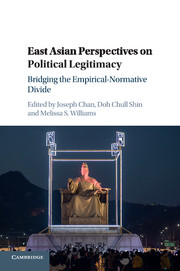Book contents
- Frontmatter
- Contents
- List of Contributors
- Preface and Acknowledgments
- 1 Political Legitimacy in East Asia: Bridging Normative and Empirical Analysis
- 2 Reasons to Obey: “Multiple Modernities” and Constructions of Political Legitimacy
- 3 Do East Asian States Enjoy a Legitimacy Premium?
- 4 Political Legitimacy in China: A Confucian Approach
- 5 Political Legitimacy in Hong Kong: A Hybrid Notion
- 6 The Evolution of Political Legitimacy in Singapore: Electoral Institutions, Governmental Performance, Moral Authority, and Meritocracy
- 7 Polarized Politics, Government Legitimacy, and Democratic Legitimacy in Taiwan
- 8 The Legitimacy of Democratic Rule in Korea: From the Perspective of the Mass Citizenry
- 9 Political Legitimacy, Satisfaction, and Japanese Democracy
- 10 Legitimacy as a Hybrid Phenomenon
- Index
2 - Reasons to Obey: “Multiple Modernities” and Constructions of Political Legitimacy
Published online by Cambridge University Press: 30 December 2016
- Frontmatter
- Contents
- List of Contributors
- Preface and Acknowledgments
- 1 Political Legitimacy in East Asia: Bridging Normative and Empirical Analysis
- 2 Reasons to Obey: “Multiple Modernities” and Constructions of Political Legitimacy
- 3 Do East Asian States Enjoy a Legitimacy Premium?
- 4 Political Legitimacy in China: A Confucian Approach
- 5 Political Legitimacy in Hong Kong: A Hybrid Notion
- 6 The Evolution of Political Legitimacy in Singapore: Electoral Institutions, Governmental Performance, Moral Authority, and Meritocracy
- 7 Polarized Politics, Government Legitimacy, and Democratic Legitimacy in Taiwan
- 8 The Legitimacy of Democratic Rule in Korea: From the Perspective of the Mass Citizenry
- 9 Political Legitimacy, Satisfaction, and Japanese Democracy
- 10 Legitimacy as a Hybrid Phenomenon
- Index
Summary
Legitimacy is much more than a matter of theoretical or philosophical speculation; it rather constitutes the basis of very real differences in the empirical structure of domination. The reason for this fact lies in the generally observable need of any power, or even of any advantage of life, to justify itself.
– Max WeberWe have to speak of “multiple modernities,” different ways of erecting and animating the institutional forms that are becoming inescapable.
– Charles TaylorINTRODUCTION
Political legitimacy is centrally concerned with the justification of political authority: what reasons do people have to obey the commands (comply with the law, follow the rules) of a political order? So understood, legitimacy is an intrinsically normative construct: not any reason counts toward legitimacy, but only reasons that are valid from a moral point of view. As Max Weber acknowledged, people have many different reasons to comply with the dictates of political power holders, but only some of these reasons – the normative ones – count toward the legitimacy of a regime. Hope of benefits and fear of sanctions constitute prudential reasons for obedience, but they do not reflect the people's judgment whether the political order is justified in its exercise of power. Thus while many interpreters of the distinction between empirical and normative accounts of political legitimacy characterize the former as “descriptive” and the latter as “prescriptive,” this is misleading. It makes perfect sense for empirical social scientists to seek to understand the degree to which a particular political order enjoys legitimacy in the eyes of its people, but to be meaningful this endeavor must take account of whether the people believe its power of command to be justifiable according to some normative principle that they endorse.
In Western intellectual traditions, theoretical accounts of political legitimacy are deeply connected to the circumstances of modernity. The connection between modernity and theories of political legitimacy is equally strong for the social scientific tradition inaugurated by Max Weber and for the normative tradition of political philosophy stretching from Locke and Rousseau to Rawls and Habermas.
- Type
- Chapter
- Information
- East Asian Perspectives on Political LegitimacyBridging the Empirical-Normative Divide, pp. 25 - 54Publisher: Cambridge University PressPrint publication year: 2016
- 2
- Cited by



